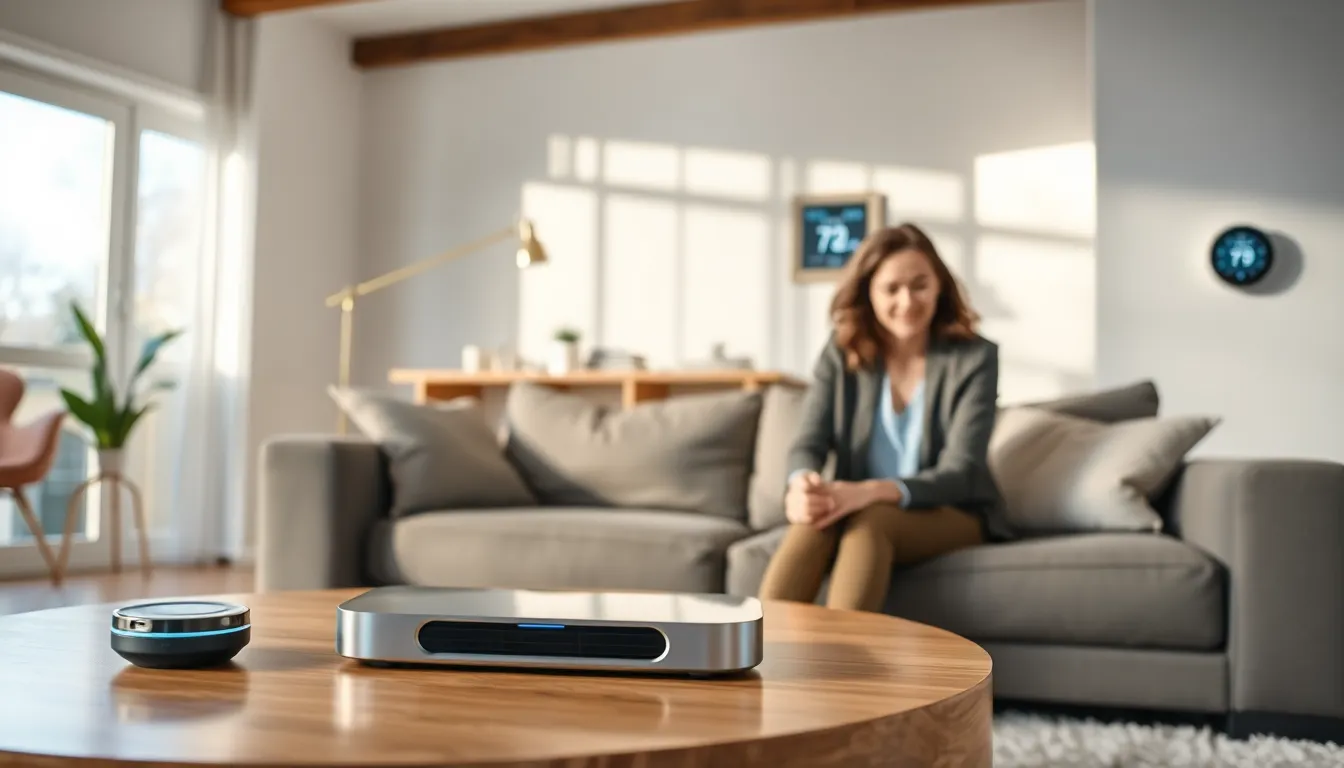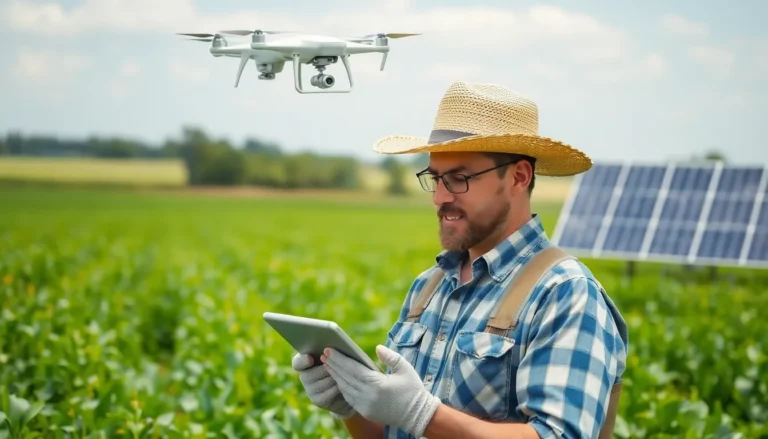Table of Contents
ToggleIn a world increasingly driven by technology, intelligent tech products are transforming everyday life. From smart home devices that learn user preferences to AI-driven applications that enhance productivity, these innovations are reshaping how people interact with their environments. As the demand for efficiency and convenience grows, so does the range of intelligent solutions available on the market.
Consumers today are faced with a plethora of choices, each promising to make life easier and more connected. Understanding the features and benefits of these products is essential for making informed decisions. This article delves into the fascinating landscape of intelligent tech products, exploring their capabilities, advantages, and the impact they have on modern living.
Overview of Intelligent Tech Products
Intelligent tech products encompass a variety of devices that enhance daily tasks through automation and connectivity. These products include smart home devices, wearable technology, and AI-driven software applications. By integrating sensors, software, and connectivity, they offer improved efficiency and user experience.
Smart Home Devices
Smart home devices provide control and automation for home environments. Examples include smart thermostats, smart locks, and smart lighting systems. These products allow users to manage home settings remotely, monitor energy consumption, and enhance security through real-time alerts.
Wearable Technology
Wearable technology consists of devices designed to be worn on the body. Examples include smartwatches, fitness trackers, and health monitoring devices. These products track physical activities, monitor health metrics, and provide notifications, allowing users to maintain an active lifestyle more effectively.
AI-Driven Applications
AI-driven applications leverage machine learning algorithms to automate tasks and improve decision-making. Examples include virtual assistants, recommendation systems, and customer support chatbots. These applications enhance user interactions by providing personalized experiences and efficient support.
Benefits of Intelligent Tech Products
Intelligent tech products improve convenience, save time, and increase productivity. They enhance the quality of life by automating routine tasks and providing real-time insights. Users experience greater control over their environments, leading to informed decisions and efficient living.
As intelligent tech products continue to evolve, they reshape how people engage with their surroundings and enhance modern living experiences.
Benefits of Intelligent Tech Products

Intelligent tech products offer significant advantages that enhance daily living. These benefits include optimized efficiency and superior user experiences.
Enhanced Efficiency
Enhanced efficiency stems from automation and integration. Intelligent tech products streamline tasks and reduce time spent on mundane activities. Smart home devices automate lighting, climate control, and security, allowing users to manage everything through a single platform. For instance, smart thermostats adjust temperatures based on user preferences and schedules, saving energy and costs. Wearable technology monitors health metrics 24/7, providing actionable insights that improve fitness and wellness routines. AI-driven applications can process data rapidly, enabling quicker decision-making and task completion. By reducing repetitive tasks, these products increase overall productivity.
Improved User Experience
Improved user experience results from personalized interactions and intuitive design. Intelligent tech products adapt to individual preferences, offering tailored solutions that meet diverse needs. Smart home devices provide voice-activated controls, allowing seamless operation without manual input. This increases accessibility for all users, including those with disabilities. Wearable technology supplies real-time feedback, helping users make informed choices about their health and activities. AI applications learn from user behavior, refining their recommendations and enhancing engagement over time. Users enjoy a more interactive and satisfying experience, fostering deeper connections with technology and their environments.
Popular Categories of Intelligent Tech Products
Intelligent tech products encompass various categories, each offering unique benefits and features that enhance daily life. These products include smart home devices, wearable technology, and intelligent personal assistants.
Smart Home Devices
Smart home devices streamline home management and enhance security through connectivity. Thermostats adjust temperatures autonomously based on user behavior, promoting energy efficiency. Security cameras allow real-time monitoring via smartphones, ensuring peace of mind. Smart lighting systems enable remote control of illumination, contributing to convenience and energy savings. As connectivity expands, these devices integrate with other technologies, creating a cohesive smart home ecosystem.
Wearable Technology
Wearable technology focuses on health and fitness, offering users the ability to monitor their well-being actively. Smartwatches provide notifications and fitness tracking, facilitating seamless integration of daily activities. Fitness trackers quantify physical exertion, aiding users in reaching health goals. Health monitoring wearables can detect heart rate and sleep patterns, enabling proactive management of health conditions. This technology fosters a proactive approach to personal well-being, promoting healthier lifestyles.
Intelligent Personal Assistants
Intelligent personal assistants simplify task management using voice recognition and AI. Devices like Amazon Echo or Google Nest enable users to set reminders, make calls, and control other smart devices hands-free. They offer personalized recommendations based on user interactions, optimizing daily routines. These assistants integrate with various applications, making them versatile tools in managing schedules, accessing information, and enhancing overall efficiency in everyday tasks.
Challenges and Considerations
Adopting intelligent tech products involves navigating several challenges and considerations. Key factors include security concerns and integration issues that can impact user experience and device effectiveness.
Security Concerns
Security risks pose significant challenges for intelligent tech products. Devices often collect sensitive personal data, making them targets for cyberattacks. For instance, unsecured smart home devices can lead to unauthorized access to home networks, resulting in privacy breaches. Moreover, wearables that track health metrics may expose users to data theft, endangering their confidential health information. Ensuring robust security measures, such as encryption and regular software updates, is essential to mitigate these risks and protect user data.
Integration Issues
Integration issues frequently hinder the seamless use of intelligent tech products. Compatibility problems arise when devices from different manufacturers fail to communicate effectively. For example, a smart thermostat might not integrate with a specific home automation system, limiting its functionality. Furthermore, varied software ecosystems can create challenges in user experience, as differing interfaces may confuse users trying to manage multiple devices. Ensuring that products are designed with standard protocols and compatibility in mind enhances integration and helps users realize the full potential of intelligent technology.
Future Trends in Intelligent Tech Products
Innovations continuously shape the landscape of intelligent tech products. Shifts toward sustainability drive the development of eco-friendly smart devices. Companies increasingly focus on energy-efficient solutions, combining performance with reduced environmental impact. For example, smart home devices now feature energy-saving modes and solar-powered options.
Artificial intelligence (AI) integration remains a defining trend. AI enhances device functionality through advanced learning algorithms, allowing tech products to adapt to user preferences. For instance, smart speakers provide personalized recommendations based on listening habits and routines, creating a tailored experience.
Connectivity will evolve with the widespread adoption of 5G technology. Faster internet speeds enhance the performance of smart devices, enabling real-time data exchange. Smart home systems will function more efficiently, allowing devices to communicate seamlessly. This connectivity fosters a more interconnected environment, improving automation capabilities.
Health and wellness applications will significantly expand their presence in wearable technology. Devices that monitor health metrics will integrate AI for deeper insights and predictive analytics. For instance, fitness trackers may offer personalized workout plans based on real-time data analysis, guiding users toward better health outcomes.
Data privacy and security measures will take center stage. As intelligent tech products collect extensive personal data, consumers will demand stronger protections. Manufacturers will focus on developing robust encryption protocols and transparent data usage policies. Enhancing security measures gains importance to build user trust and ensure compliance with regulations.
Augmented reality (AR) and virtual reality (VR) integration will also emerge in intelligent tech products. These technologies offer immersive experiences, particularly in retail and gaming sectors. For example, AR applications allow consumers to visualize products in their homes before purchase, bridging the gap between online and in-store shopping experiences.
The rise of voice-activated controls will shape user interaction patterns. More intelligent devices will incorporate voice recognition, simplifying user commands and making technology more accessible. Voice-activated personal assistants will evolve, offering advanced functionalities and improving convenience for daily tasks.
Future trends in intelligent tech products are marked by sustainability, AI advancements, enhanced connectivity, health integration, security focus, AR/VR applications, and voice control improvements. These developments promise a more efficient and personalized experience for users, transforming everyday interactions with technology.
Intelligent tech products are undeniably reshaping the way individuals interact with their environments. As consumers embrace these innovations for their efficiency and convenience, it’s essential to remain vigilant about security and integration challenges. By understanding these factors, users can maximize the benefits of smart home devices, wearables, and AI applications.
The future holds exciting possibilities with advancements in sustainability, AI, and connectivity. As technology continues to evolve, it promises to enhance the user experience further. Staying informed about emerging trends will empower consumers to navigate this dynamic landscape and fully leverage the transformative potential of intelligent tech products in their daily lives.







